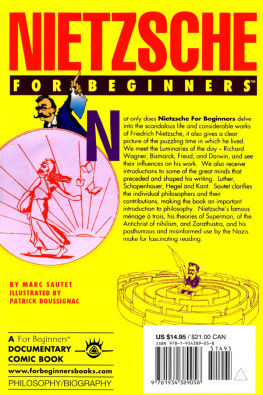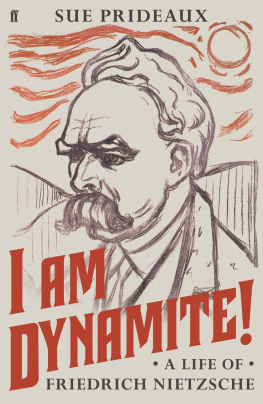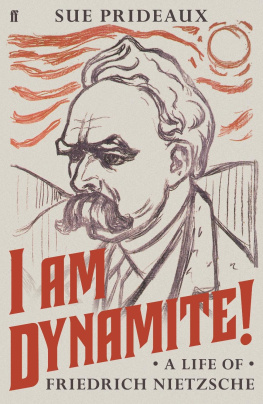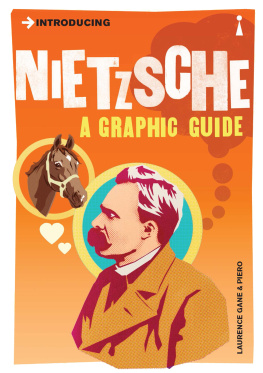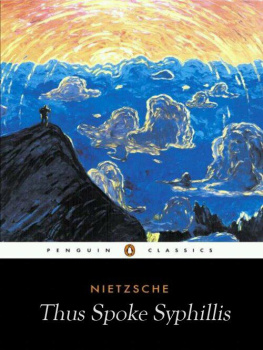Nietzsche
A Beginners Guide
ONEWORLD BEGINNERS GUIDES combine an original, inventive, and engaging approach with expert analysis on subjects ranging from art and history to religion and politics, and everything in between. Innovative and affordable, books in the series are perfect for anyone curious about the way the world works and the big ideas of our time.
aesthetics
africa
anarchism
aquinas
art
artificial intelligence
the bahai faith
the beat generation
biodiversity
bioterror & biowarfare
the brain
british politics
the buddha
cancer
censorship
christianity
civil liberties
classical music
climate change
cloning
cold war
conservation
crimes against humanity
criminal psychology
critical thinking
daoism
democracy
descartes
dyslexia
energy
engineering
the enlightenment
epistemology
evolution
evolutionary psychology
existentialism
fair trade
feminism
forensic science
french revolution
genetics
global terrorism
hinduism
history of science
humanism
islamic philosophy
journalism
judaism
lacan
life in the universe
literary theory
machiavelli
mafia & organized crime
magic
marx
medieval philosophy
middle east
NATO
nietzsche
the northern ireland conflict
oil
opera
the palestineisraeli conflict
paul
philosophy of mind
philosophy of religion
philosophy of science
planet earth
postmodernism
psychology
quantum physics
the quran
racism
renaissance art
shakespeare
the small arms trade
the torah
sufism
volcanoes


A Oneworld Book
First Published by Oneworld Publications as
Nietzsche (Oneworld Philosophers), 2002
First published in the Beginners Guide series 2010
This ebook edition published in 2012
Copyright Robert Wicks 2002
The right of Robert Wicks to be identified as the Author of this work has been asserted by him in accordance with the Copyright, Designs and Patents Act 1988
All rights reserved
Copyright under Berne Convention
A CIP record for this title is available from the British Library
ISBN 978-1-85168-757-2
ebook ISBN 978-1-78074-170-3
Cover design by vaguelymemorable.com
Oneworld Publications
10 Bloomsbury Street, London, WC1B 3SR England
Stay up to date with the latest books, special offers, and exclusive content from Oneworld with our monthly newsletter
Sign up on our website
www.oneworld-publications.com
The ideal of the most exuberant, life-filled, world-affirming person, who has not only learned to make peace with and to tolerate, what was and is, but who wants further to have just how it was and is repeated throughout all eternity, insatiably calling out da capo, not only to himself, but to the entire performance and show.
Beyond Good and Evil, 56
Cynicism is the unique form in which unpolished souls can come into contact with what honesty is. And the higher ones should open their ears to every coarse and refined piece of cynicism, and consider it fortunate, when the joker without shame or the scientific satyr speaks out to them.
Beyond Good and Evil, 26
I do not want to be a saint; better to be a jester. Perhaps I am a jester.
Ecce Homo, Why I am an Inevitability, 1
I am a disciple of the philosopher Dionysus; Id prefer to be a satyr, rather than a saint.
Ecce Homo, Preface
For Catherine, Florence, Elaine and Charles
Preface
Some problems are universal. Alexandra David-Nel (18681969) the first European woman to explore the Tibetan capital of Lhasa (in 1924, in disguise) was once given the same pragmatic advice by an unnamed hermit in the remote Himalayan wilderness as was offered to Nietzsches fictional character, Zarathustra, when he expressed his own desire to communicate his mountaintop-inspired thoughts to the general population. The hermit counselled David-Nel to resist publishing her knowledge of the secret oral teachings in Tibetan Buddhist sects, because it probably would be a wasted effort. The teachings could be published surely enough, but they would remain secret nonetheless, for few ears would be in tune with their message. Like Nietzsches Thus Spoke Zarathustra A Book for All and None (188385), David-Nel would be writing from the spiritual heights an essentially closed book, and would be offering an invitation to be misunderstood, neglected, and possibly condemned.
Having decided to brush against the social fiber, both David-Nel religious scholar, adventurer, person-of-wisdom, and a prime candidate for a Nietzschean superhuman in her own right and Zarathustra made light of the soberly hermetic advice and proceeded to put their thoughts into writing. Nietzsches philosophy, in particular, ended up expressing the frustration of the perennial tension between sociality and individuality, along with the uneasy interdependency between respectable tradition and the irreverent avant-garde. Nietzsches external life might have been unassuming, but he often experienced at a spiritual level the solitude of the absolute monarch whose distanced position requires the sacrifice of equal-to-equal friendships and comfortable community.
And thus was his Zarathustra written 6000 feet beyond people and time, from a perspective that few, if any, of us will ever be able to appreciate abundantly from the inside. Perhaps Friedrich Nietzsche will never be understood as he wished to be understood, for how difficult it is to overcome, or go perspectivally above, almost every ideal type that human culture has set forth to date as a matter of spiritual nourishment and cultural integration above the ascetic priest, above the great-souled, magnanimous person of classical virtue, above the recognitions bestowed by worldly fame, above the greatest actors, actresses, and musicians, and above most of what we imagine to be the worthy dedications of our lives.
Perhaps Nietzsche was somewhat mistaken about his having been able to discern future social tendencies and, very possibly, over-zealous in his dedication to set forth the optimal conditions for a reinvigorating, down-to-earth health and flourishing. Such shortcomings would, fortunately, have the effect of rendering his thought more accessible than a more perfect realization of it might have allowed. And yet, despite its limitations, Nietzsche offers us some trying challenges, most of which amount to a dare to define ourselves realistically as complicated, living, now-existing, perishable, and thoroughly embodied creative creatures, as opposed to being a set of purely rational, eternal, and essentially simple souls, which are thought to be spatially, temporally, and only temporarily incarcerated in an alien physicality. Nietzsche longed for release and redemption within this world, not another one; he longed for what he took to be real, rather than imaginary, freedom.
Some of the themes treated in this survey of Nietzsches outlook his doctrines of eternal recurrence, the will to power, the superhuman, the death of God, perspectivism, his critique of Christian morality, his intellectual relationships to Immanuel Kant and Arthur Schopenhauer, his friendship with Richard Wagner, his influence on contemporary European thought have been individually treated by numerous Nietzsche scholars in longer, more detailed works. The bibliography will, I hope, direct those whose interest in Nietzsche has been stimulated by this study to enhance and transform their appreciation of his radical ideas. Of special note is the impeccable work of Maudemarie Clark, whose attention to Nietzsches theory of knowledge has influentially structured the perspective offered here. I am also indebted to an anonymous reviewer of the manuscript and to my colleague at the University of Auckland, John Bishop, both of whom provided perceptive and constructively detailed criticisms of each chapter. My own approach to Nietzsche tends to reflect an interest in the existential and psychological import of philosophical theories.
Next page
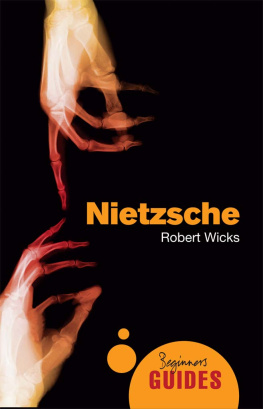



![Wicks - Lean in 15: [15-minute meals and workouts to keep you lean and healthy]](/uploads/posts/book/228194/thumbs/wicks-lean-in-15-15-minute-meals-and-workouts.jpg)

